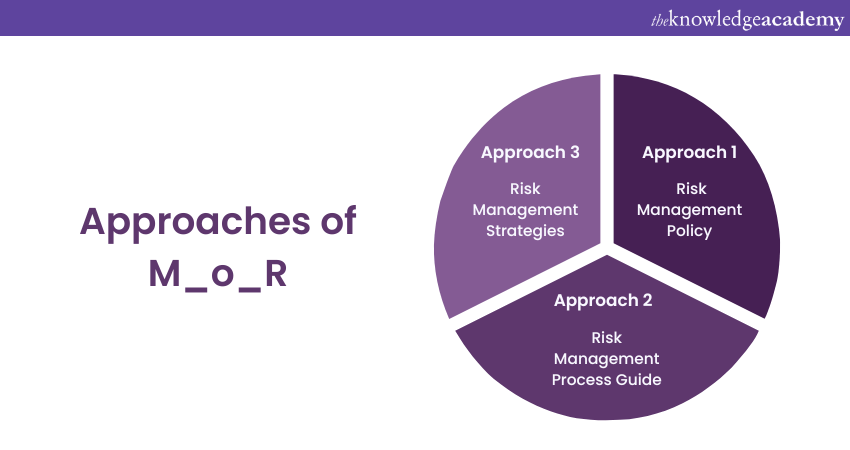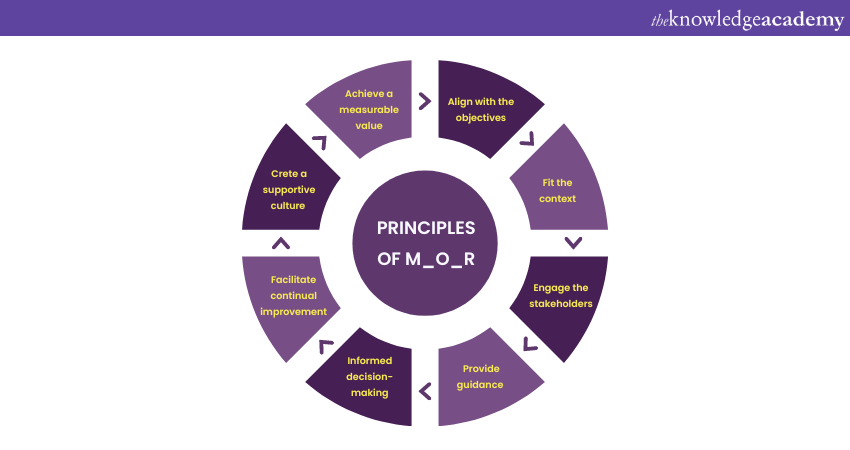We may not have the course you’re looking for. If you enquire or give us a call on +44 1344 203999 and speak to our training experts, we may still be able to help with your training requirements.
Training Outcomes Within Your Budget!
We ensure quality, budget-alignment, and timely delivery by our expert instructors.

Risk management is one of the most important facets of an organisation’s optimal operation. Risk management is conducted by identifying, evaluating and prioritising risks and applying resources to mitigate its effects.
Importance of Risk Management in Organisations gave rise to a framework called the Management of Risk (M_o_R) guide. It consists of M_o_R principles, approach, process and application. This blog will throw light on the M_o_R principles as well as the whole framework of the guide.
Table of Contents
1) M_o_R: An Introduction
2) What does the M_o_R framework consist of?
3) What are the M_o_R principles?
a) Aligns with objectives
b) Fits the context
c) Engages stakeholders
d) Provides clear guidance
e) Informs decision-making
f) Facilitates continual improvement
g) Creates a supportive culture
h) Achieves measurable value
4) Conclusion
M_o_R: An Introduction
The M_o_R guide, developed by AXELOS, serves to help organisations establish a framework for effective risk management. The guide's purpose is to help organisations in decision-making regarding strategic objectives that concern risk management.
M_o_R can be applied to three elements of an organisation, namely - strategic, change, and operational. The framework helps in better management of threats and opportunities, improves services of an organisation and improves value for money.
What does the M_o_R framework consist of?
The M_o_R framework consists of four components as follows:
1) Principles: The principles help in developing and maintaining ideal risk management practices.
2) Approach: The organisation needs to adapt the aforementioned principles into an M_o_R approach to suit their specific needs.
3) Process: The process consists of four steps, namely - identifying, assessing, planning and implementing risk management strategies.
4) Application: The last component is the total application of the M_o_R approach across the organisation, and ensure optimal risk management.

To know more about M_o_R, sign up for the MoR® 4 Practitioner Risk Management Certification.
What are the M_o_R principles?
The M_o_R framework is built on eight core principles as listed below:
1) Aligns with objectives
2) Fits the context
3) Engages stakeholders
4) Provides clear guidance
5) Informs decision-making
6) Facilitates continual improvement
7) Creates a supportive culture
8) Achieves measurable value
While the first seven are enablers that help in risk management, the final one is the end result when the framework is implemented well. When put together, they collectively form a structure from which an organisation can derive its risk management approach. M_o_R practitioner will help in understanding the implementation of principles to various real time scenarios.
These principles are universal, meaning that they can be applied to any business. The framework can analyse situations at different levels/departments of an organisation, regardless of the industry. However, their implementation may differ as per the needs of the organisation.

Conclusion
All in all, the M_o_R principles along with the other components of the framework ensures proper risk management. By implementing the principles, approach, process and application, one can understand how M_o_R works and an organisation can prevent risks and curb threats according to their needs.
Not only does the M_o_R approach helps an organisation prevent risks, but it also helps create strategies to deal with them. In a competitive world, organisations can only survive if they adapt – and the M_o_R approach helps them achieve that objective by overcoming the challenges of Management of Risk.
To know more about M_o_R, sign up for the MoR® Management of Risk course!
Frequently Asked Questions
Upcoming Business Skills Resources Batches & Dates
Date
 MoR® 4 Practitioner Risk Management Certification
MoR® 4 Practitioner Risk Management Certification
Mon 13th Jan 2025
Mon 10th Mar 2025
Mon 12th May 2025
Mon 14th Jul 2025
Mon 15th Sep 2025
Mon 10th Nov 2025
Mon 15th Dec 2025







 Top Rated Course
Top Rated Course



 If you wish to make any changes to your course, please
If you wish to make any changes to your course, please


